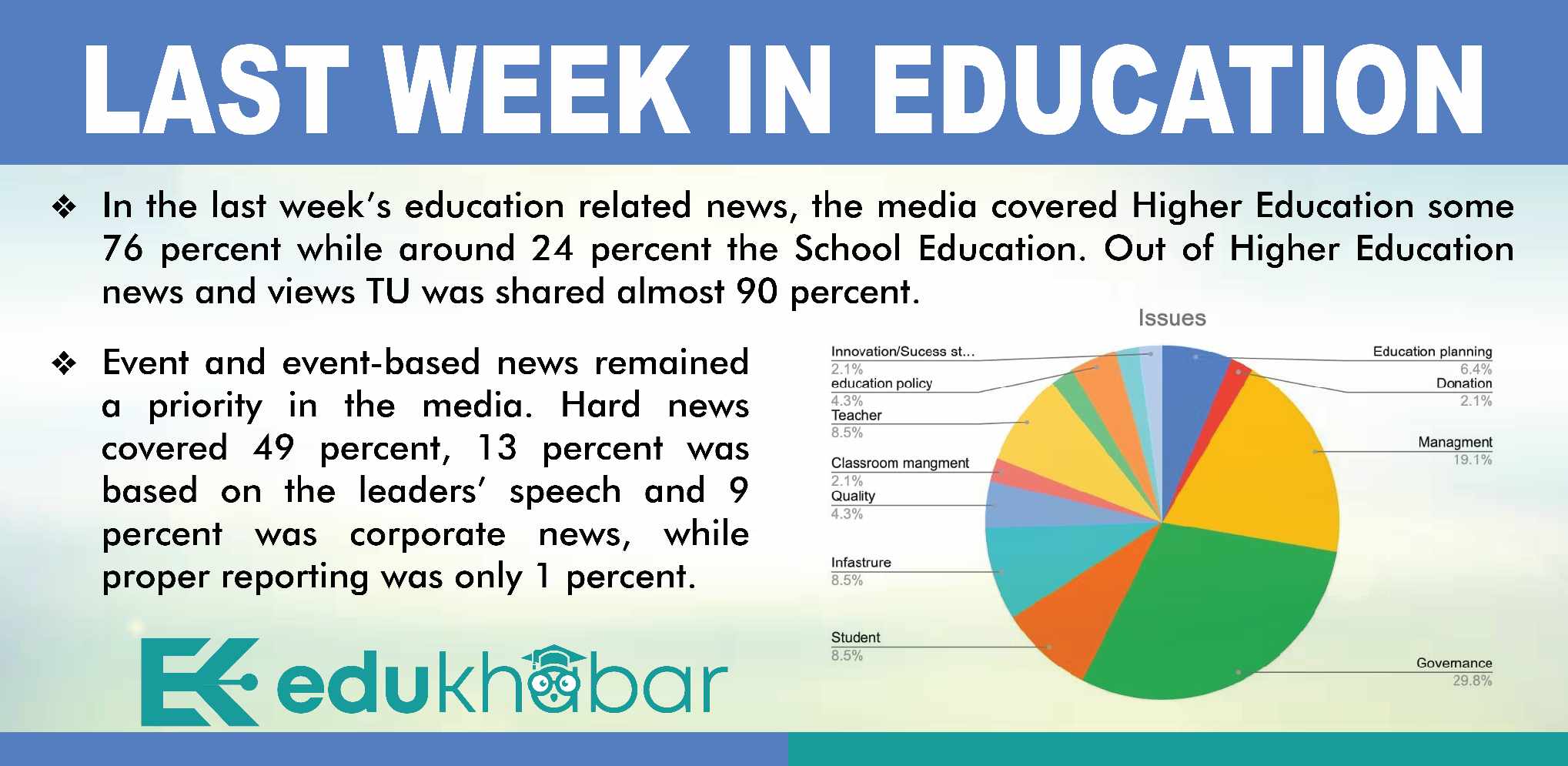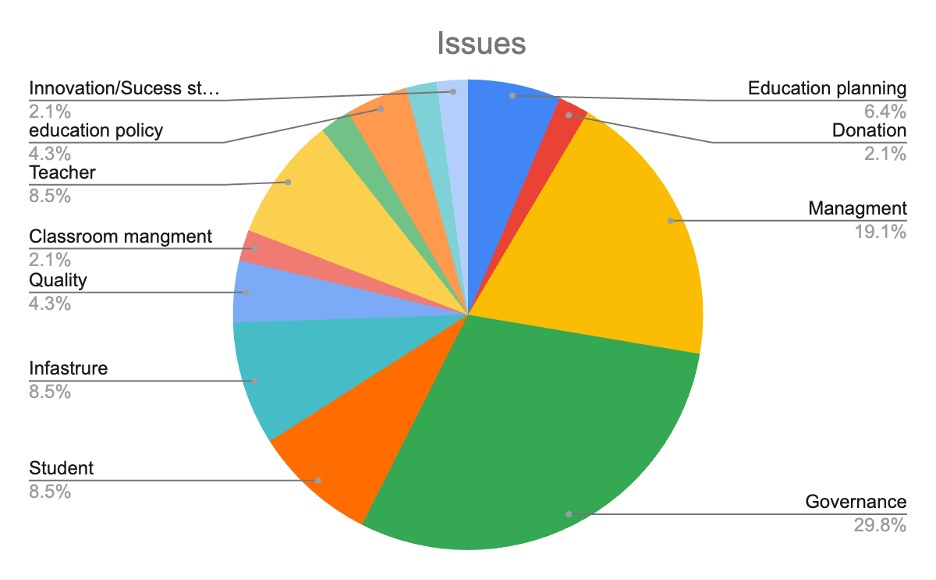
The news and opinions regarding the selection of Vice Chancellor (VC) of Tribhuvan University (TU) became a major topic in the media also last week.
The matter of shortlisting controversial persons for selection of the VC of TU and scheduling of the presentation of their vision/concepts and work plan and following interviews have been given priority.
Another university centered educational news last week was the meeting of vice-chancellors of the Union of Indian Universities of the North Region and the Nepal India Higher Education Summit hosted by Kathmandu University (KU).
In the last week's education related news, the media covered Higher Education (HE) some 76 percent while around 24 percent the School Education (SE). Out of HE news and views TU was shared almost 90 percent, 7 percent KU and 4 percent Rajarshi Janak University.
Event and event-based news remained a priority in the media. Hard news covered 49 percent, 13 percent was based on the leaders' speech and 9 percent was corporate news, while proper reporting was only 1 percent.

Following shortlisting of the VC, the Education, Health and Information Technology Committee of the Parliament called the Minister of State for Education and the Secretary of the Ministry of Education Science and Technology (MoEST), who is also a member of the Selection Committee, and inquired about the process and basis of shortlisting. The parliamentarians (MPs) demanded that the controversial individuals should be removed from the list, the selection process should be cancelled and a fresh process should be started.
To make the selection process of the VC transparent Prof Chaitanya Mishra, leading sociologist and public intellectual wrote to the Prime Minister (PM), Ministers and the MPs, urging them to pay attention to the seriousness of the appointment. 'The appointment of VC, the SE and HE Bills are not ordinary matters' he was quoted saying.
Although PM promised not intervening politically in the selection process, MPs also protested against the list in the National Assembly saying that those who were already tested and proven failed to perform in the University were again being proposed to appointed as the VC !
However, on Sunday evening, the names of three people have been recommended for the post of Vice-Chancellor of the University.
Read the news from here: Budhathoki, Baral and Dhamala recommended as Vice-Chancellor
Similarly, in Kantipur and Ratopati, there was news that the criteria for choosing VCs in different universities are different and that the criteria for making TU VC is weak than other universities. Along with TU, the government has also started the process of appointing VCs of Eastern, Midwestern and Farwestern universities.
In TU and other three universities, the weightage given to the research work of the candidate of the VC is not the same. While there are only 6 points for the research work for the VC of TU, 36 points are allocated for Central and Far Western Universities for the same. Secretary of MoEST is a member in all four universities' VC selection committee.
The selection criteria of the university may differ from university to university according to the requirements, but it is not acceptable to have an weaker criteria for the VC of the University such as TU than for a smaller universities. It is necessary to make the minimum and university specific standards for the selection of high officials. A minimum criteria should be that a controversial person is not shortlisted, the person who is trusted by the public and who has capability to give results should be included. Even if someone does not apply for the leading posts, a the provision of offering the job to a suitable/capable person for the position of VC should be included in the new provisions.
The beginning of selecting the VC through open competition gives a message that at least sharing the key position of TU between the political parties is not right, mentioned an article. The article analyzes the method and process adopted for the competition; there are some theoretical and practical weaknesses. It is suggested that the candidate's plan should be presented at different stages to professors, students and staff of TU.
While the process of appointment of VC in TU is continuing on the basis of competition, the news that Acting VC Shiva Lal Bhushal has appointed assistant deans, heads of departments of TU and heads of campuses based blessing of affiliated political parties was also published last week.
In another news of TU, it is mentioned that Pro. Dr. Kaviprasad Pakharel, the head of the Central Department of Education, has been accused of messing up withthe marks of the students, distribution of certificates with the signature of the head of the examination department where the head of the department should be shigned, holding online classes, not paying the teachers who have taken online classes before, etc.
Prime Minister Pushpa Kamal Dahal said at the meeting of Vice Chancellors of the Union of Indian Universities North Region and Nepal India Higher Education Summit organized by KU in Dhulikhel that South Asian countries like Nepal should be able to stop the outflow of students and funds to acquire higher education. It is informed that 150 vice-chancellors and educationists from different countries of Nepal, India and Africa will participate in the two-day conference.
It is mentioned in the news that the participants will discuss about student exchange, joint research and curriculum modification for effective strategies to improve the quality of higher education and internationalize it.
It was news that the proposed Nepal University (NU) Bill was theoretically discussed in the Education, Health and Information Technology Committee of the Parliament Experts from NU have presented the reasons for the need after the parliamentarians raised the question of why they want a new University in the discussion to advance the bill that has been passed by the National Assembly to the House of Representatives.
The Central Department of Journalism and Mass Communication of TU has moved to its own newly constructed building in Balkhu.
It has been reported in a news that the teachers too contributed one month's salary on the initiative of former students to support the dscision of Shivsatasi Municipality of Jhapa to purchase a bus for the community school.
Finance Minister Prakasharan Mahat says that the budget will be formulated to increase investment in technical and vocational education to create employment.
The students of Baglung Mankhola Rural Municipality-6, Narjakhani have been relieved of having to walk 6 hours a day to study after getting residential facilities in the school with the help of the Municipality.
It is mentioned in the news that Suvarna Sedhai, the Pithadhish of Narsingdham in Dhading, claimed a PhD in physics from Australia's Bulangang University, but it could not be confirmed.
After Australia and Canada started tightening the visa, the news that Nepalese students are attracted to Europe has been broadcast on a television news?. It is mentioned in the news that 2,960 students went to Norway, France, Denmark, and Finland in the last 6 months.
The C hief Minister of Gandaki Province Surendraraj Pandey said in a program that the education given by the university should stop the migration of young people abroad.
The Teachers Service Commission has called for vacancy of 778 teachers for lower secondary level. It has been reported in the news that the Commission has advertised for the posts of teachers in 9 different subjects across the country.
In another news story, Dambar Thami from Dolakha, who dropped out from study and joined the Maoist armed conflict, re-educated and became a successful school teacher after the peace process started in the country. He became a science teacher in a school that was closed due to Maoist objection to teaching Sanskrit during the conflict.
There is a news that the IT Federation of Nepal has demanded that computer engineering should be taught in the Secondary Level by the B.Sc. CSIT passed students.Student Union, close to CPN-UML, Kavre branch has filed a petition in the Supreme Court demanding for free secondary education. Article 31 of the constitution mentions that Nepali citizens can study education up to class 12 for free, but the writ mentions that students are charged fees for various topics.
A news about the beginning of the discussion that the education sector should not be commercialized in contradiction to the constitutional provision of free education was also published last week. 'As suggested in the High Level National Education Commission', the speakers of the discussion said that 'the system of gradually converting private schools into Guthi (Public Trust) should be implemented'.
In another news, the Center for Education and Human Resource Development issued a circular to the Education Development and Coordination Units across the country and instructed them not to charge any fee to the newly appointed teachers.
With the investment of the Nepal Army Welfare Fund, a school building has been constructed at Chhauni to educate the children with special abilities of the army personnel - serving and retired . It is mentioned in the news that 30 children with special abilities will be enrolled in the school from academic session 2081. An interview on how to make children addicted to reading was broadcast on Nepal Television. Similarly, there is news that Jiwanjyoti Secondary School in Syangja has started theoretical and practical classes by keeping students at school from classes 6 to 12 under the supervision of teachers for 12 hours.
'Education Last Week' is a joint effort to analyze the press coverage of education in Nepal’s selected media. The main aim of this effort is to identify, enumerate and explain major education issues picked up by the media and give back and foreground of the news from the perspective of social justice and creative pedagogies. This, we believe, will help policy makers and other responsible people to keep abreast with ongoing concerns and discussions on and around education. EduKhabar, in collaboration with the Center for Educational Policies and Practices (CEPP), has produced this analysis based on the matter carried in dailies Kantipur, Gorkhapatra (Nepali) and The Himalayan Times (English), online media Onlinekhabar, Setopati and Ratopati and Himalayan TV and Nepal Television between 11 - 16 Feb 2024 (28 Magh-4 Falgun 2080) - the Editor.
Read this analysis in Nepali : विद्यालय शिक्षा कम प्राथमिकतामा, उच्च शिक्षामा पनि त्रिवि केन्द्रित
प्रतिक्रिया